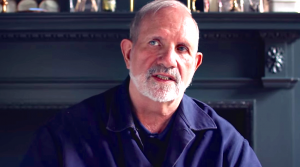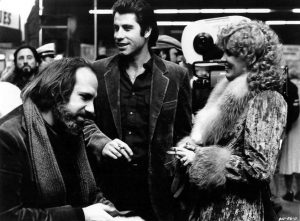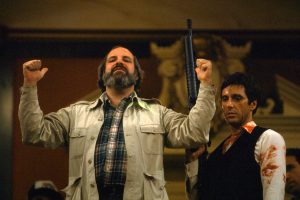![]()
If you’re a cinema aficionado, you probably have some idea of who director Brian De Palma is. Over his career, he’s had massive successes (Carrie, Dressed to Kill, The Untouchables, Mission: Impossible), some disasters (The Bonfire of the Vanities, Mission to Mars) and a few flicks that now qualify as cult phenomenons (Sisters, Phantom of the Paradise, Blow Out, Scarface and Carlito’s Way to name but a few). De Palma has always been a polarizing figure with critics, garnering all manner of reactions for his elaborate, graphic, voyeuristic, seamy and often exaggerated filmmaking techniques.
 Personally, I appreciate his bravado. He’s a superb storyteller and there’s something to enjoy even in his biggest misfires. Now in his late 70s, the filmmaker sits down with friends and admirers Noah Baumbach (Mistress America, While We’re Young, Francis Ha) and Jake Paltrow for an enjoyable and enlightening career overview. Despite a standard documentary format that finds the man seated while the narrative progresses film by film through his entire catalog, the subject himself is every bit as dynamic a storyteller onscreen as behind the camera.
Personally, I appreciate his bravado. He’s a superb storyteller and there’s something to enjoy even in his biggest misfires. Now in his late 70s, the filmmaker sits down with friends and admirers Noah Baumbach (Mistress America, While We’re Young, Francis Ha) and Jake Paltrow for an enjoyable and enlightening career overview. Despite a standard documentary format that finds the man seated while the narrative progresses film by film through his entire catalog, the subject himself is every bit as dynamic a storyteller onscreen as behind the camera.
De Palma appears very comfortable with his interviewers (Baumbach has interviewed him in the past for several supplemental features on Criterion Blu-ray releases) and the director opens up in a refreshing and honest way. He also doesn’t appear to care about upsetting anyone as he recounts his personal ups and downs through decades in the film industry, leading to some insights that fans might not have even known.
 There’s some very interesting information about his early years that really foreshadow his cinematic predilections. From his strained relationship with his adulterous MD father (whom he used to watch conduct surgery) to his physics studies at Columbia that ultimately led to an obsession with camera equipment and cinematic techniques, as well as his political beliefs, many elements of his personal life have influenced his work in one form or another.
There’s some very interesting information about his early years that really foreshadow his cinematic predilections. From his strained relationship with his adulterous MD father (whom he used to watch conduct surgery) to his physics studies at Columbia that ultimately led to an obsession with camera equipment and cinematic techniques, as well as his political beliefs, many elements of his personal life have influenced his work in one form or another.
He also elaborates on his reverence for Alfred Hitchcock and his attempts to tell stories in a purely visual manner; be it using complicated long takes, split screen and split diopter methods. The tech-head muses on his boredom with traditional shooting and “shot reverse shot” coverage, which he describes as dull and tedious to watch, effectively arguing that long masters establish geography within the film world and build a sense of tension more efficiently.
 Viewers will see clips from early projects (some with a baby-faced Robert De Niro in his onscreen debut) and witness De Palma amusingly relay stories on managing star’s egos. Cliff Robertson takes a hilarious beating and De Palma goes into the tension on set while shooting the underrated Casualties of War (1989). He notes Sean Penn’s method acting resulted in hard times for co-star Michael J. Fox both onscreen as well as on set.
Viewers will see clips from early projects (some with a baby-faced Robert De Niro in his onscreen debut) and witness De Palma amusingly relay stories on managing star’s egos. Cliff Robertson takes a hilarious beating and De Palma goes into the tension on set while shooting the underrated Casualties of War (1989). He notes Sean Penn’s method acting resulted in hard times for co-star Michael J. Fox both onscreen as well as on set.
Of course, the director makes sure to comment on the negative press that has befallen him on many of his features, suggesting reaction to several of his films have fallen prey to the critical fads and fashions of the day. But De Palma also has no qualms about his own missteps or butting heads with studio personnel. At one point, he laments the loss of the finale to his thriller Snake Eyes (1998) and viewers finally get to see a few seconds from the big climax that was needlessly cut out of the film by studio heads.
 The doc doesn’t spend as much time on his last four features. In fact, the filmmaker even states that his best years as a director are now well behind him. It’s too bad, because I would have liked to have been given a bit more insight into the enjoyably pulpy puzzle-box that is Femme Fatale (2002). And I refuse to believe that he doesn’t still have some great movies left in him if given the opportunity.
The doc doesn’t spend as much time on his last four features. In fact, the filmmaker even states that his best years as a director are now well behind him. It’s too bad, because I would have liked to have been given a bit more insight into the enjoyably pulpy puzzle-box that is Femme Fatale (2002). And I refuse to believe that he doesn’t still have some great movies left in him if given the opportunity.
Those who dislike or are completely unfamiliar with the movie-maker are unlikely to change their tune or share the same enthusiasm for De Palma. Still, this documentary is a positive step towards giving an underrated director his due. It’s a must-see for fans. And anyone who has seen even a few of his titles will enjoy the production… not to mention walk out from the conversation with plenty of films to add to their Netflix cues.


